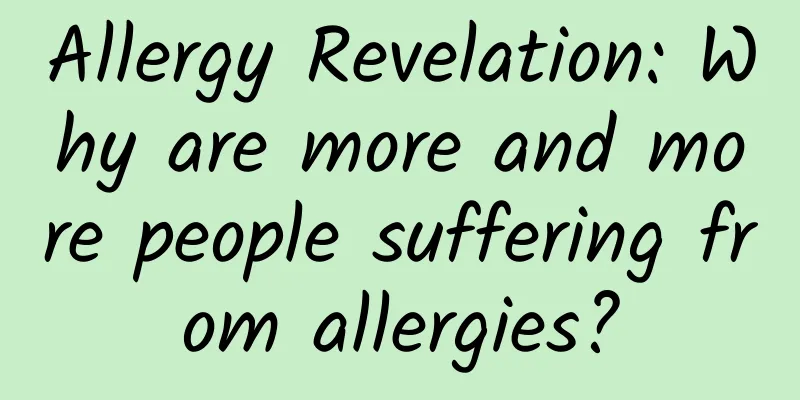Allergy Revelation: Why are more and more people suffering from allergies?

|
© Buckhead Primary and Urgent Care Clinic Leviathan Press: In recent years, several of my friends have said that they never had pollen allergies before, but have suffered from allergies every year in the past one or two years. When it is serious, they sneeze, have tears and runny noses, and finally have to rely on drugs to relieve the symptoms. In fact, scientists have always been puzzled by how pollen, a relatively harmless substance, triggers such a strong reaction in the human immune system - but what is certain is that with the abnormal global climate/warming, people's allergy season is also significantly longer, and more and more new patients are joining the ranks of allergy sufferers. These days, many Americans are living in a daze under the haze of antihistamines, sneezing, runny noses, itching all over their bodies... Everyone I talked to expressed the same complaint: This allergy season is the worst. I have no choice but to accept it. In New York, where I live, the tiny green-yellow flowers of maple trees and the caterpillar-like catkins of birch and oak are pollen bombs that seem to explode with more vigor than usual. As I write this, pollen-irritated tears mixed with mascara stream down my eyelashes. A colleague who relies on drowsiness-inducing decongestants has to drink large amounts of espresso to get through the day. **Allergy complaints come every spring, but people's symptoms seem to be getting worse. Blame climate change: **Allergy season is "getting longer and more intense" because plants have more time to produce more pollen, says Kenneth Mendez, CEO of the Asthma and Allergy Foundation of America. **The problem isn't just that higher temperatures extend the growing season; carbon dioxide itself boosts pollen production. According to research published in the Proceedings of the National Academy of Sciences (PNAS), compared to 30 years ago, the pollen season in North America is now about 20 days earlier, lasts about 8 days longer, and the amount of pollen has increased by 21%[1]. © Tumblr But it’s not just chronic allergy sufferers like me who are suffering; all these pollens seem to trigger seasonal allergies in people who aren’t allergic to pollen. Allergies have skyrocketed in recent years: in 2018, 7.7% of American adults had experienced “hay fever” (another term for seasonal allergies); by 2021, that proportion had risen to about a quarter.[2] In the coming years, temperatures will only continue to rise, filling the air with more pollen, which may cause more people to have allergies. This trend cannot be stopped. **Whether a person develops seasonal allergies depends largely on two factors: genetics and environment. ** Some people are naturally more susceptible to allergies, and climate change hasn’t changed that, Kathleen May, president of the American College of Allergy, Asthma & Immunology, told me. Yet the environment is changing. The link between temperature, CO2 levels and pollen – the fine yellow dust some plants release to reproduce – is well established. Decades ago, scientists learned that plants thrive in greenhouses with high CO2 levels[3] and that for some plants, such conditions produce more pollen than they would otherwise[4]. This is now happening on a continental scale. **Allergies occur when a person's immune system mistakenly labels harmless particles as dangerous and begins producing allergy-fighting antibodies, known as IgE immunoglobulins, in preparation for the next exposure. **When IgE antibodies detect enough allergens, they launch an explosive attack on the invader, releasing chemicals that cause itching, sneezing, nasal congestion and swelling, and other classic allergic reaction symptoms. © Axios **To complicate matters further, not everyone who develops these antibodies and is therefore "sensitive" to allergens will experience symptoms whenever pollen flies up their nose. **With seasonal allergies, "it takes a certain amount of time or exposure to cause allergy symptoms," May said. **In other words, some people who think they don't have allergies actually do have allergies — they just haven't been exposed to enough pollen to experience symptoms. **Mendes says the body reacts when it "senses there's too much." By filling the air with pollen for longer periods of time, climate change increases the chances that people will reach their allergy thresholds, both those with long-standing allergies and those who are just starting to develop them. “Some people who might not have had symptoms before will now start to develop symptoms, and for those who already have symptoms, it will definitely make it worse,” May said. Some of these newly allergy sufferers, especially adults, may then experience lifelong seasonal allergy symptoms. Due to a phenomenon known as the “priming effect,” the amount of pollen needed to trigger allergy symptoms may decrease in subsequent allergy seasons, meaning that even a little bit of pollen in the air can eventually cause a mess in the nasal cavity [5]. Children may outgrow the condition after their teenage years, but adults are less likely to do so, for reasons that are not yet clear, May said. In general, it’s safe to say that more pollen means more allergy symptoms, but as the planet continues to warm, the number of people suffering from seasonal allergies will increase significantly, though exactly how much is still unclear. According to one study[6], adults in U.S. counties where spring starts significantly earlier than historical averages are 14% more likely to suffer from seasonal allergies than adults in counties where spring starts normally. A European modeling study[7] suggests that the number of people sensitive to the common irritant ragweed could more than double from 33 million to 77 million by as early as 2041 due to climate change. Allergy increases are a worldwide problem, but they are not evenly distributed geographically. In the United States, allergy increases are currently more severe in Texas and the Midwest, according to a study in the Proceedings of the National Academy of Sciences. William Anderegg, a professor of biology at the University of Utah and the lead author of the study, told me that he is not sure why this is the case, but one possibility is that the plants that grow there particularly like warm environments, and as temperatures rise, these plants migrate to new environments and rapidly reproduce and spread. © BBC We are simply not prepared for the full range of impacts that climate change will have on allergies. As temperatures continue to rise across the country, Andereger notes, pollen season will likely continue year-round, as it does in other warmer regions. The effects could be particularly severe in cities, where daytime temperatures could be up to 7 degrees Celsius warmer than in neighboring rural areas.[8] Exacerbating pollen allergies are social factors, such as low rates of over-the-counter allergy medication use and a shortage of allergy specialists in the South and East, making those regions some of the most challenging places to live in the country for allergy sufferers, according to a recent report from the Asthma and Allergy Foundation of America. However, even when pollen is in the air, people can do a lot to ease their allergy symptoms. If they receive a warning via a pollen weather forecast, they can stock up on medication, plan around pollen counts, and take allergy medication before symptoms start, maximizing the benefits of allergy medication. More advanced pollen monitoring (pollen counts across the country are still often done manually) could help provide more timely pollen forecasts in the long run.[9] Still, there’s no getting around the fact that allergies are yet another inconvenience that climate change is bringing to our lives. © BBC Even as the U.S. and other parts of the world make real progress in reducing carbon emissions, global warming means that pollen allergies will continue to be a problem, and in some cases, can snowball into a cascade of problems. Seasonal allergies are a trigger for asthma, which can require hospitalization, and they can also make people more susceptible to some viruses, including the coronavirus. “There are a whole range of huge societal impacts that we tend not to think about too much,” including reduced labor productivity and poorer school performance, Andereger said. Allergies are certainly far from the most devastating impact of climate change, but the hellish atmosphere of this pollen season is a reminder that even the slightest climate impacts can cause big trouble. References: [1]www.pnas.org/doi/10.1073/pnas.2013284118 [2]stacks.cdc.gov/view/cdc/122809 [3]www.science.org/content/article/sneezing-global-warming [4]pubmed.ncbi.nlm.nih.gov/11926621/ [5]www.sciencedirect.com/science/article/abs/pii/0021870769900185 [6]journals.plos.org/plosone/article?id=10.1371/journal.pone.0212010 [7]ehp.niehs.nih.gov/doi/10.1289/EHP173 [8] www.epa.gov/heatislands [9]link.springer.com/article/10.1007/s11882-023-01073-2 By Yasmin Tayag Translated by Bella Proofreading/Rabbit's Light Footsteps original www.theatlantic.com/science/archive/2023/05/seasonal-allergies-pollen-climate-change/673935/ This article is based on the Creative Commons License (BY-NC) and is published by Bella on Leviathan The article only reflects the author's views and does not necessarily represent the position of Leviathan |
>>: Too advanced to be shown! What exactly is the much-anticipated "reusable spacecraft"?
Recommend
Zhu Shiba's "Xuelang Plan: From Settlement to Selling Courses" explains the whole process of Xuelang selling courses
Zhu Shiba's "Xuelang Plan: From Settleme...
Volkswagen and Mobileye sign cooperation agreement to develop autonomous driving
According to foreign media reports, Volkswagen Gr...
Selection, training, service, retirement: How are excellent guide dogs trained?
Guide dogs are working dogs. When they encounter ...
The number of followers increased by 4.1 million in two weeks! How to make Douyin’s automobile account a hit?
1. What content formats are available for automot...
The dilemma of TV boxes: Are users forced to become the final winners?
In just three months, the TV box was sentenced to...
National Fitness Day丨If you don’t do fitness correctly, you will just waste time? Learn about these fitness misunderstandings
Today is National Fitness Day. Do you know how to...
Do you hold your phone with your little finger? Doctors warn...
Have you ever observed carefully? How do you hold...
How to plan website activities in November, the peak season for e-commerce?
If someone asked you how to increase sales of an ...
Amazing! Intestinal flora can actually metabolize nicotine?
Author: Zhao Bei Smoking is harmful to health, bu...
Wandoujia opens up a new way to discover personalized content
Wandoujia, China's most popular and active &q...
Alipay APP changes its icon: 2021 "Collect Five Blessings" is here, with more ways to play this year
There is less than a month left until the 2021 Sp...
A powerful anti-inflammatory ingredient is hidden in this "golden seasoning"
Curry is really delicious! Curry chicken, curry b...
SEO: How much does it cost to build a website?
Nowadays, there is a new form on the Internet alm...
【Penguin Drawing】Map Collection Game Tutorial
【Penguin Drawing】Map Collection Gameplay Tutorial...









